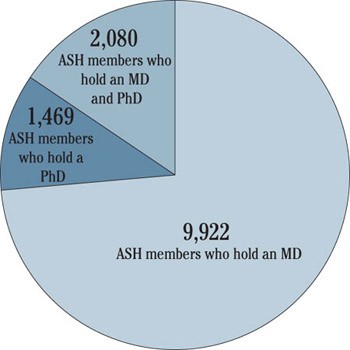Recent advances in our understanding of hematologic disease have been due to the contributions of individuals in a variety of disciplines including molecular biology, cell biology, biochemistry, immunology, pharmacology, and toxicology. A significant proportion of these investigators hold PhD degrees. Despite the growing role of PhDs in hematology research, many of these pioneers remain unaware of the benefits of membership in our Society. Membership data confirms this incongruity: 9,922 ASH members hold an MD degree, 1,469 hold a PhD degree, and 2,080 have earned both an MD and a PhD. Surely, a more unified community with these research scientists would lead to even greater advancements and innovations in the field of hematology.
In an effort to entice more PhDs to become members of the ASH community, at its 2005 annual meeting the Society amended its bylaws to extend Associate membership to PhD trainees and post-doctoral researchers. Under the new bylaw, American, Mexican, and Canadian students who have received a PhD degree and are in a post-doctoral position or a training program in a hematology-related field are eligible to be Associate members for the first four years after the degree has been awarded. Also at the ASH 2005 Annual Meeting, PhD candidates and post-doctoral fellows were encouraged to attend and participate in all trainee sessions, including several career-building seminars. Furthermore, the ASH Trainee Council has recently added two new positions (reserved for PhD members) as a means of inviting the voice of our PhD membership.
Advertising the advantages of ASH membership is the key to expanding PhD Associate membership. These benefits include special membership rates and preferred housing for the ASH annual meeting, subscriptions to Blood and other ASH publications, and discounts on ASH products and programs. In the future, we hope to continue expanding upon these opportunities by addressing new needs identified by our PhD members.
Since the 2005 ASH Annual Meeting, 70 new PhD investigators have become Associate members. We encourage all trainee program directors, graduate school directors, and current ASH members (both MD and PhD) to sustain this success by sharing with trainees the benefits of ASH membership. In this way, we hope to ensure our continued innovative progress as well as develop a stronger scientific congress in the field of hematology.

